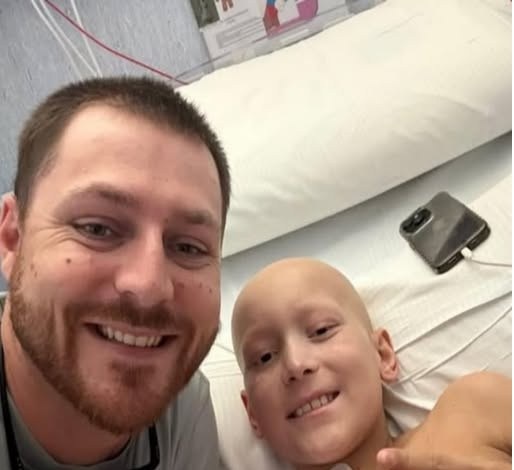Today is not just another date on the calendar—it is a day that carries the weight of hope, fear, and unwavering faith, all bound together in one fragile thread.
In a quiet medical facility nestled in the historic heart of Rome, Italy, the sterile air is filled with anticipation.
Nichole Blevins, a mother from Robertsdale, Alabama, sits in a hospital gown, her hands trembling slightly as she prepares for what may be the most important medical procedure of her life.
Doctors and nurses move gently around her, aware of the gravity of what is about to happen.
They are preparing to collect what Nichole affectionately calls her “mama cells”—a name that carries both tenderness and profound meaning.
These immune cells are not just tiny pieces of biology. For Nichole, they are a symbol of love distilled into its purest form, a mother’s sacrifice transformed into medicine.
To her son Branson, they are far more than that—they may be his lifeline, the bridge between despair and a future still waiting to be written.
Branson is only 11 years old, but already he has lived through struggles that would break the spirit of many adults.
Diagnosed with a rare and aggressive form of T-cell leukemia, his childhood has been consumed not by playgrounds and adventures, but by hospital rooms and relentless treatments.
In the span of months, he has endured what could feel like a lifetime of hardship.
Brutal chemotherapy sessions have stripped his small body of energy, leaving him frail yet determined.
Nights once filled with carefree dreams have instead been haunted by the sound of monitors beeping, IV drips humming, and doctors’ hurried footsteps echoing down sterile corridors.
Countless hospital stays have become his new normal, and with each discharge comes the quiet dread of another admission waiting just around the corner.
The fear is unrelenting—waves of uncertainty that crash over Branson and his family without warning, threatening to pull them under.
Physical exhaustion gnaws at him daily, and emotional fatigue weighs heavily on his spirit, but somehow, he continues to push forward.
For his mother, watching her son suffer has been a trial beyond words. Every needle, every test, every setback has pierced her heart as if it were her own wound.
And yet, she has remained steadfast, drawing strength from her faith, her family, and her unshakable love for her little boy.
Through it all, Branson has shown extraordinary courage, the kind of resilience that humbles even the most battle-hardened souls.
His smile, though sometimes faint, carries more power than any words.
His laughter, rare but genuine, reminds everyone around him that hope still lives, even in the darkest nights.
Nurses whisper that he has become their inspiration, a reminder of why they chose this profession.
Doctors admire his willpower, often saying that his determination gives the treatments themselves a greater chance to succeed.
Friends and strangers alike, hearing his story, find themselves moved to tears, inspired by a child who refuses to give up.
In Rome, far from home, Nichole clings to that courage.
As she prepares for the procedure, she closes her eyes and prays—not just for herself, but for her son, for the strength to endure what lies ahead.
She remembers holding Branson as a newborn, fragile and perfect, never imagining that one day her own body might hold the key to his survival.
The thought brings tears to her eyes, but also a fierce determination.
“If my cells can give him a chance,” she whispers, “then every sacrifice is worth it.”
Outside the hospital room, the city of Rome stirs awake, oblivious to the miracle being prepared within these walls.
Tourists gather at fountains, vendors open their shops, and life continues—yet for the Blevins family, time feels suspended, hanging on what happens next.
This groundbreaking therapy represents more than science; it represents love, sacrifice, and the unbreakable bond between a mother and her child.
It is not guaranteed, it is not easy, but it is a chance—and that is enough to keep hope alive.
Branson, though weary, knows what his mother is doing. His young heart carries both fear and gratitude.
He has told her many times, “Mama, you’re my hero,” words that melt her resolve into tears every time.
And in truth, she is his hero—not because of medical procedures or brave decisions, but because she has never stopped fighting for him, never stopped believing.
The journey is far from over. Ahead lie risks, challenges, and the long road of recovery.
But today, in this small hospital room in Rome, something greater than fear is at work.
Faith, hope, and love intertwine, creating a force stronger than leukemia, stronger than despair.
Whatever the outcome, this moment will forever stand as a testament to a mother’s love and a child’s courage.
And as Nichole’s “mama cells” are collected, one truth becomes clear: miracles are not always sudden—they are often built from sacrifice, love, and the unwavering belief that tomorrow can still be brighter.
